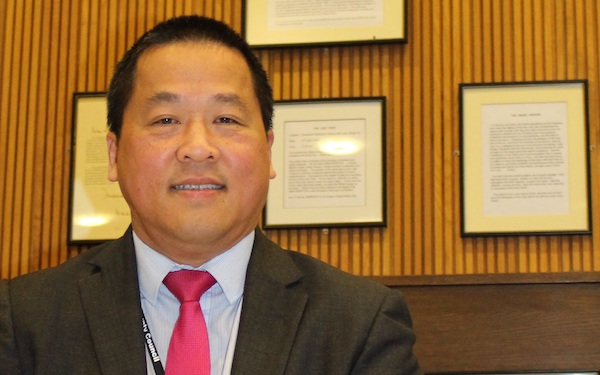On 1 August, social work manager, Edward Wong, left London to become one of Norfolk County Council’s head of localities. We asked him to tell us how he found the move and why Norfolk’s locality model made his decision to leave the capital a win-win situation.
What attracted you to working in Norfolk?
I was looking for a change. I had been in Central Bedfordshire for four years and was very interested in Norfolk’s locality delivery model. In Central Bedfordshire I was head of corporate parenting and my portfolio focused on children looked after team, leaving care team, and fostering and adoption.
In contrast, in Norfolk each locality is structured to offer early help services right through to leaving care. I find this model was very attractive because I oversee the entire child’s journey in children’s social care.
Why was this attractive compared to what you did in Central Bedfordshire?
The advantage is I now oversee the entire child’s journey from the front door to leaving care so I can ensure each child’s experience is positive. A child may exit the social care system at any stage from initial referral to leaving care so I can now focus on achieving the best outcomes for each child at all stages.
How does Norfolk’s locality model benefit frontline social workers?
The benefit is consistency. Consistency in leadership, consistency in management decisions. Because I am responsible for the resource for the whole locality my knowledge of local needs is much better and I am visible at frontline level. Frontline staff experience consistency in decisions and closer leadership that understands the issues they face.
Your two localities – West Norfolk and Breckland – cover a big area. How did you find that after working in a more compact authority?
Initially it was challenging because I sometimes spend time at County Hall in Norwich and it takes almost an hour and a half to get there from King’s Lynn, which is in my localities. So managing time was challenging but Norfolk has invested heavily in digital communications.
Help with relocation
– Generous relocation scheme, including access to a second home allowance (under review for enhancement)
– Access to our car provision scheme
– Access to an interest-free loan of up to £5,000 for relocation expenses
We have Skype and telephone conferencing so social workers do not have to spend so much time travelling. That means social workers feel empowered to manage their time and working from home is perfectly acceptable too. One gets used to the distances too and it is a beautiful county to travel through, which was part of the attraction.
You lived in London before coming to Norfolk. Did you get much help with the relocation?
Relocating was a difficult decision for me and my family but after making the move we have no regrets at all. The relocation package is really generous and the council was very responsive to my needs as someone moving from London to Norfolk.
The move has been a win-win situation. The stunning natural beauty, being part of a forward-looking and innovative council and property that is very affordable compared to London. There was nothing to lose by coming here. On the contrary, there is everything to gain.
Were you concerned about the challenges Norfolk children’s services have been facing when applying?
I was a little apprehensive given the Ofsted inspections but that went as soon as I started in my new post. The social work team has seen a lot of changes for the better since the negative Ofsted and I do believe Norfolk has now turned a corner.
More and more permanent workers are coming in and the senior leadership team has changed and is now permanent. We have a new, permanent director of children’s services starting this month, I am permanent and so are the other two heads of localities. The heads of social work are all, apart from one, permanent and agency social workers are being replaced by permanent staff.
The culture is one of investment, high quality training and learning opportunities such as Systemic Supervision for all front line managers, and wanting to do the very best for children and young people.
What innovations in Norfolk are you most excited by?
It was only after I started that I truly realised the fantastic things happening here. The Social Care Academy that oversees the professional development of social workers and personal advisers. The phase 2 implementation of Signs of Safety, which is embedding that approach even further in practice.
Norfolk is also a Restorative Practice local authority that’s repairing the relationship in families where young people have engaged in offending behaviour. These are really outward-looking and innovative practices.
What do you want to achieve in your localities?
I believe in positive role-modelling. I am fortunate enough to have a line manager who empowers me to lead. I, in turn, see myself an empowering leader. So I actively encourage and invite challenge within my teams.
I want my managers and social workers to feel empowered. I believe that managers and social workers need to feel autonomous while also being held accountable for their work. I find this empowering culture in Norfolk.




 Facebook
Facebook X
X LinkedIn
LinkedIn Instagram
Instagram